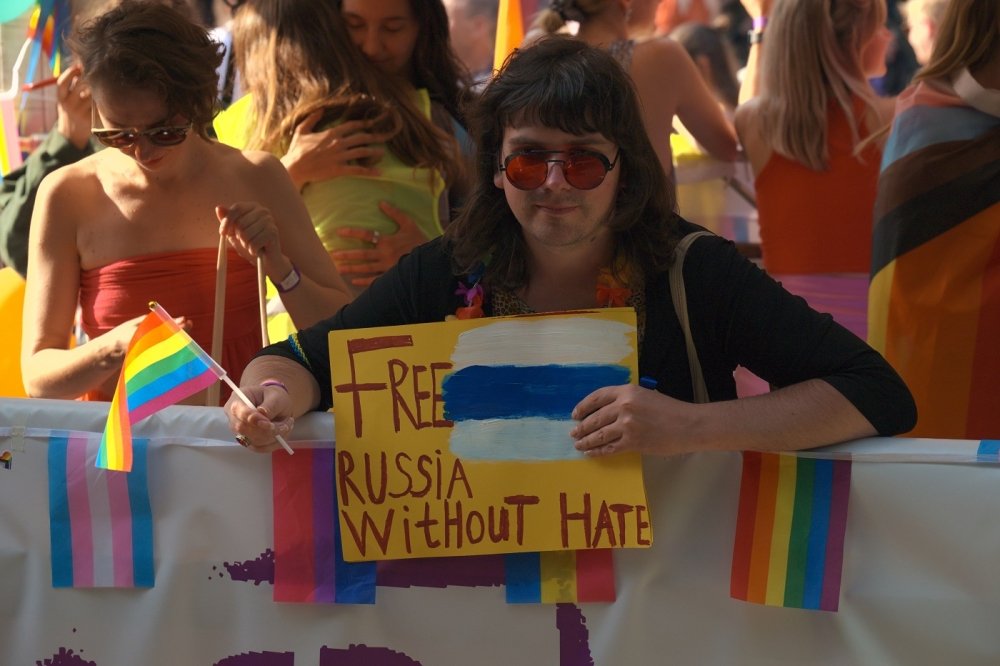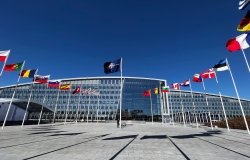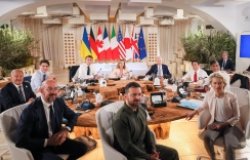
A blog of the Kennan Institute
Russia’s War on the LGBTQ+ Community Continues

A new law signed by President Vladimir Putin on July 24 makes it illegal to change gender identifiers on legal documents or to alter one’s physical characteristics for the purposes of gender transition through medical or surgical procedures. Russia’s parliament had passed the bill in mid-June, after the Duma members present voted unanimously in favor of it. Moreover, individuals who changed their gender identifier prior to passage of the new law are prohibited from adopting children and may have their marriage annulled.
The banning of legal and medical gender transition marks a significant escalation in the Kremlin’s attack on the LGBTQ+ community in Russia.
A Short History of Russia’s Anti-LGBTQ+ Legislation
In 2013, Russia passed a federal ban on the distribution of “propaganda about nontraditional sexual relationships” to minors, known colloquially as the “gay propaganda” law. It prohibited positive to neutral expressions of LGBTQ+ identity in Russia that could be viewed or heard by children. In effect, it banned the mention of LGBTQ+ people in public venues and the media.
The November 2022 update to the gay propaganda law transformed what was previously an audience age restriction into a total ban on expressions of LGBTQ+ identity. It also increased the maximum fines for infractions, which now run as high as 400,000 rubles ($6,600 USD) for offending individuals and up to five million rubles (more than $80,000 USD) for organizations. The ban applies to both Russian and foreign entities. For example, Roskomnadzor, the Russian federal agency charged with oversight (and censorship authority) of mass media, fined TikTok more than three million rubles last October for promoting “videos with LGBT themes.”
The number of cases tried under the gay propaganda law this year is already at its highest point since 2014. There were six cases total in 2021, sixteen in 2022, and more than forty in the first half of 2023 alone. A sample of recent cases tracked by OVD-Info shows charges brought against an administrator of a social media page for LGBTQ+ individuals, streaming websites that hosted movies with LGBTQ+ characters, single picket protestors opposing the gender transition ban, and plenty of instances of the state policing private communications, such as text conversations and online dating profiles.
LGBTQ+ Russians Are Vulnerable
Discrimination against transgender and gender-nonconforming individuals was already widespread in Russia before the gender transition ban. Centre T in Russia, an initiative aimed at helping transgender and nonbinary people, reports that “97 percent of transgender people have experienced harassment or discrimination in the workplace” and that 57 percent of transgender Russians face rejection by their families. Transgender individuals in Russia are vulnerable to threats or acts of coercion, including but not limited to police violence, deportation, fines, expulsion from school, forced conversion therapy, and punitive psychiatric hospitalization. They also suffer disproportionately from housing discrimination, employment discrimination, and income inequality, with transgender Russians earning on average only one-third the pay of their cisgender peers.
On a recent Russia File podcast episode and in his book, Violent Affections, Alexander Kondakov describes a correlation between the passage of the 2013 gay propaganda law and an increase in violent attacks on LGBTQ+ people in Russia. The Center for Independent Social Research reported that violence against LGBTQ+ people approximately doubled within five years of the law passing, and monitoring by the SOVA Center in Moscow indicates that rates of anti-LGBTQ+ violence continued to rise through 2021.
I asked Kondakov whether he thought that the new gender transition ban would contribute to increased violence against gender-nonconforming people in Russia. He replied that the legislation will serve to reinforce this community’s historically marginalized position: “Russia is a heteronormative society where strictly defined gender roles are considered a societal value and transgression of gender norms is sanctioned socially through a range of penalties, from mockery to violence.”
The Russian government is creating a more hostile situation for gender-nonconforming people in two ways, according to Kondakov. “First, no effort is being made by the government to encourage peace and acceptance of gender nonconformity, unlike in some other countries. Second, as this law [banning gender transition] indicates, the government fosters and even fuels intolerant attitudes toward the violation of conventional gender norms. This only makes it easier to express hostility toward transgender people; it makes hostility not only an acceptable but also a recommended reaction.”
The gender transition ban will also likely increase rates of suicide and high-risk behavior (such as seeking unregulated medical procedures) among Russia’s transgender and gender-nonconforming population, where suicide is already a worrisome issue. Estimates of the suicide rate among transgender people in Russia vary between 12 and 20 percent, and about 42 percent of transgender people in Russia have attempted suicide at least once. The type of gender-affirming care now banned under Russian law is strongly indicated to reduce suicides and improve mental health outcomes for transgender, nonbinary, and intersex individuals.
Ukraine and the Boomerang of Violence
Escalating state discrimination against the LGBTQ+ community in Russia is directly informed by the Putin regime’s struggle to maintain legitimacy and public support, especially as Russia’s war in Ukraine drags on. Russian federal elections are scheduled for 2024, and officials are reportedly planning to project record levels of public support for Putin. The war in Ukraine and discrimination against the LGBTQ+ community are both popular policies among the socially conservative interest groups that make up Putin’s strongest base of support, and Russian policymakers draw clear connections between the Kremlin's narrative that Russia is fighting Western ideology by proxy in Ukraine and the Kremlin’s attack on the LGBTQ+ experience in Russia.
The lead author of the November 2022 bill, Aleksandr Khinstein, used the language of a “special military operation” to justify his anti-LGBTQ+ legislation: “A special military operation is taking place not only on the battlefields but also in the consciousness of the people, in their minds and in their souls.” Regarding the July gender transition ban, United Russia party deputy Petr Tolstoy attributed instances of gender transition in Russia to “the Western transgender industry,” claiming that the law protects Russia from “Western anti-family ideology.”
Kondakov emphasizes that the war in Ukraine is a driving force behind violence against LGBTQ+ people and other marginalized communities in Russia: “The war will remain a major contributor to the brutalization of Russian society and a boomerang of violence from the front lines to the rear.” A 2022 survey of LGBTQ+ individuals in Russia by the Sphere Foundation found that “83% of the participants noted the growth of homophobic and/or transphobic sentiment in Russian society after the war in Ukraine began on February 24, 2022. That number is higher (87%) among transgender participants.”
As long as Russia remains in Ukraine and the current regime remains in power, then conditions are ripe for ratification of even more restrictive anti-LGBTQ+ legislation in Russia. “One of the ideas that has circulated in the Russian legislative bodies for a couple of decades by now is the criminalization of homosexuality, as in the USSR in 1933–1993,” observes Kondakov. “Perhaps this is the next step, if the Moscow regime survives to next year.”
The opinions expressed in this article are those solely of the author and do not reflect the views of the Kennan Institute.
See our newest content first.
Subscribe to receive the latest analysis from the Russia File blog.
About the Author

Lenny Lopatto
Lenny Lopatto is a Program Coordinator at the Kennan Institute. Their research focuses on disinformation, digital governance, civil society, and media freedom in Russia and the surrounding region. Prior to joining the Wilson Center, Lenny worked for the National Organization of Veterans' Advocates in Washington, DC.
Read More
Kennan Institute
The Kennan Institute is the premier US center for advanced research on Eurasia and the oldest and largest regional program at the Woodrow Wilson International Center for Scholars. The Kennan Institute is committed to improving American understanding of Russia, Ukraine, Central Asia, the South Caucasus, and the surrounding region though research and exchange. Read more











